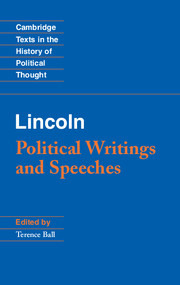Book contents
- Frontmatter
- Contents
- Preface
- Introduction
- Chronology
- Biographical synopses
- A note on sources and abbreviations
- Bibliographical note
- I Political Writings and Speeches
- 1 Autobiographical sketch
- 2 “The Perpetuation of Our Political Institutions”
- 3 Limits of Presidential Power
- 4 Speech on the Kansas–Nebraska Act
- 5 To Joshua F. Speed
- 6 Speech on the Dred Scott Decision
- 7 “A House Divided” Speech
- 8 Portion of a Speech at Edwardsville, Illinois
- 9 Seventh Lincoln–Douglas Debate
- 10 On Thomas Jefferson
- 11 Cooper Union Address
- 12 Speech at Indianapolis, Indiana
- 13 Speech at Independence Hall, Philadelphia, Pennsylvania
- 14 First Inaugural Address
- 15 Message to Congress in Special Session
- 16 Appeal to Border-State Representatives for Compensated Emancipation
- 17 Address on Colonization to a Committee of Colored Men
- 18 To Horace Greeley
- 19 Preliminary Emancipation Proclamation
- 20 Proclamation Suspending the Writ of Habeas Corpus
- 21 Second Annual Message to Congress
- 22 Final Emancipation Proclamation
- 23 To General John A. McClernand
- 24 To Erastus Corning and Others
- 25 To Matthew Birchard and Others
- 26 To James C. Conkling
- 27 The Gettysburg Address
- 28 Third Annual Message to Congress
- 29 Proclamation of Amnesty and Reconstruction
- 30 Reply to the New York Working-men’s Democratic Republican Association
- 31 To Albert G. Hodges
- 32 To Charles D. Robinson
- 33 Reply to a Southern Woman
- 34 “With Malice toward None”
- 35 Speech on Reconstruction
- II Notes and Fragments
- Index
24 - To Erastus Corning and Others
Published online by Cambridge University Press: 05 April 2013
- Frontmatter
- Contents
- Preface
- Introduction
- Chronology
- Biographical synopses
- A note on sources and abbreviations
- Bibliographical note
- I Political Writings and Speeches
- 1 Autobiographical sketch
- 2 “The Perpetuation of Our Political Institutions”
- 3 Limits of Presidential Power
- 4 Speech on the Kansas–Nebraska Act
- 5 To Joshua F. Speed
- 6 Speech on the Dred Scott Decision
- 7 “A House Divided” Speech
- 8 Portion of a Speech at Edwardsville, Illinois
- 9 Seventh Lincoln–Douglas Debate
- 10 On Thomas Jefferson
- 11 Cooper Union Address
- 12 Speech at Indianapolis, Indiana
- 13 Speech at Independence Hall, Philadelphia, Pennsylvania
- 14 First Inaugural Address
- 15 Message to Congress in Special Session
- 16 Appeal to Border-State Representatives for Compensated Emancipation
- 17 Address on Colonization to a Committee of Colored Men
- 18 To Horace Greeley
- 19 Preliminary Emancipation Proclamation
- 20 Proclamation Suspending the Writ of Habeas Corpus
- 21 Second Annual Message to Congress
- 22 Final Emancipation Proclamation
- 23 To General John A. McClernand
- 24 To Erastus Corning and Others
- 25 To Matthew Birchard and Others
- 26 To James C. Conkling
- 27 The Gettysburg Address
- 28 Third Annual Message to Congress
- 29 Proclamation of Amnesty and Reconstruction
- 30 Reply to the New York Working-men’s Democratic Republican Association
- 31 To Albert G. Hodges
- 32 To Charles D. Robinson
- 33 Reply to a Southern Woman
- 34 “With Malice toward None”
- 35 Speech on Reconstruction
- II Notes and Fragments
- Index
Summary
On May 1, 1863 former Ohio congressman Clement L. Vallandigham defied General Ambrose Burnside’s decree that anyone speaking publicly and sympathetically in defense of the Confederate cause would be summarily arrested and jailed and denied habeas corpus (see selection 20). The jailing of Vallandigham, a prominent Peace Democrat or “Copperhead,” produced public outcries at protest meetings throughout the Union. Lincoln neither knew of nor approved Burnside’s arrest of Vallandigham, but felt forced to defend it. Here he replies to resolutions passed at a meeting of loyal Democrats in Albany, New York, led by businessman and former congressman Erastus Corning.
Hon. Erastus Corningand others:
Executive Mansion,
Washington.
June 12, 1863
Gentlemen:
Your letter of May 19, inclosing the resolutions of a public meeting held at Albany, NY, on the 16th of the same month, was received several days ago.
The resolutions, as I understand them, are resolvable into two propositions – first, the expression of a purpose to sustain the cause of the Union, to secure peace through victory, and to support the Administration in every constitutional and lawful measure to suppress the Rebellion; and secondly, a declaration of censure upon the Administration for supposed unconstitutional action, such as the making of military arrests. And, from the two propositions, a third is deduced, which is that the gentlemen composing the meeting are resolved on doing their part to maintain our common government and country, despite the folly or wickedness, as they may conceive, of any Administration. This position is eminently patriotic, and as such I thank the meeting and congratulate the nation for it. My own purpose is the same; so that the meeting and myself have a common object, and can have no difference, except in the choice of means or measures for effecting that object.
. . .
- Type
- Chapter
- Information
- LincolnPolitical Writings and Speeches, pp. 172 - 180Publisher: Cambridge University PressPrint publication year: 2012



